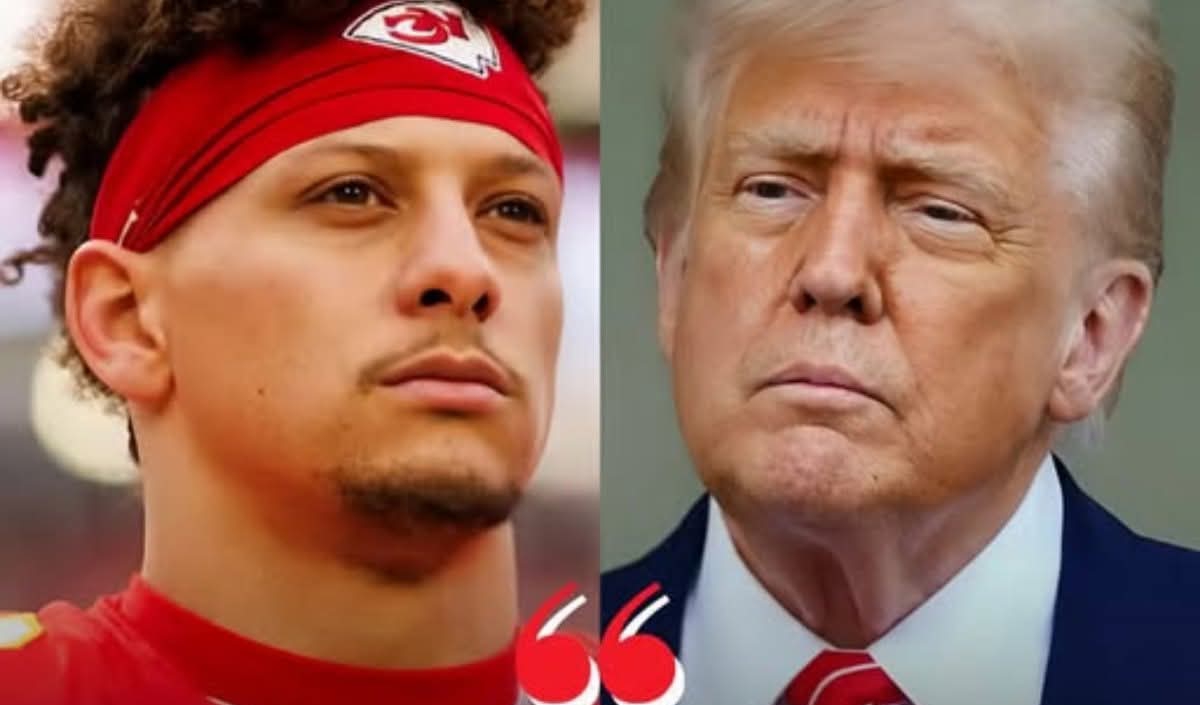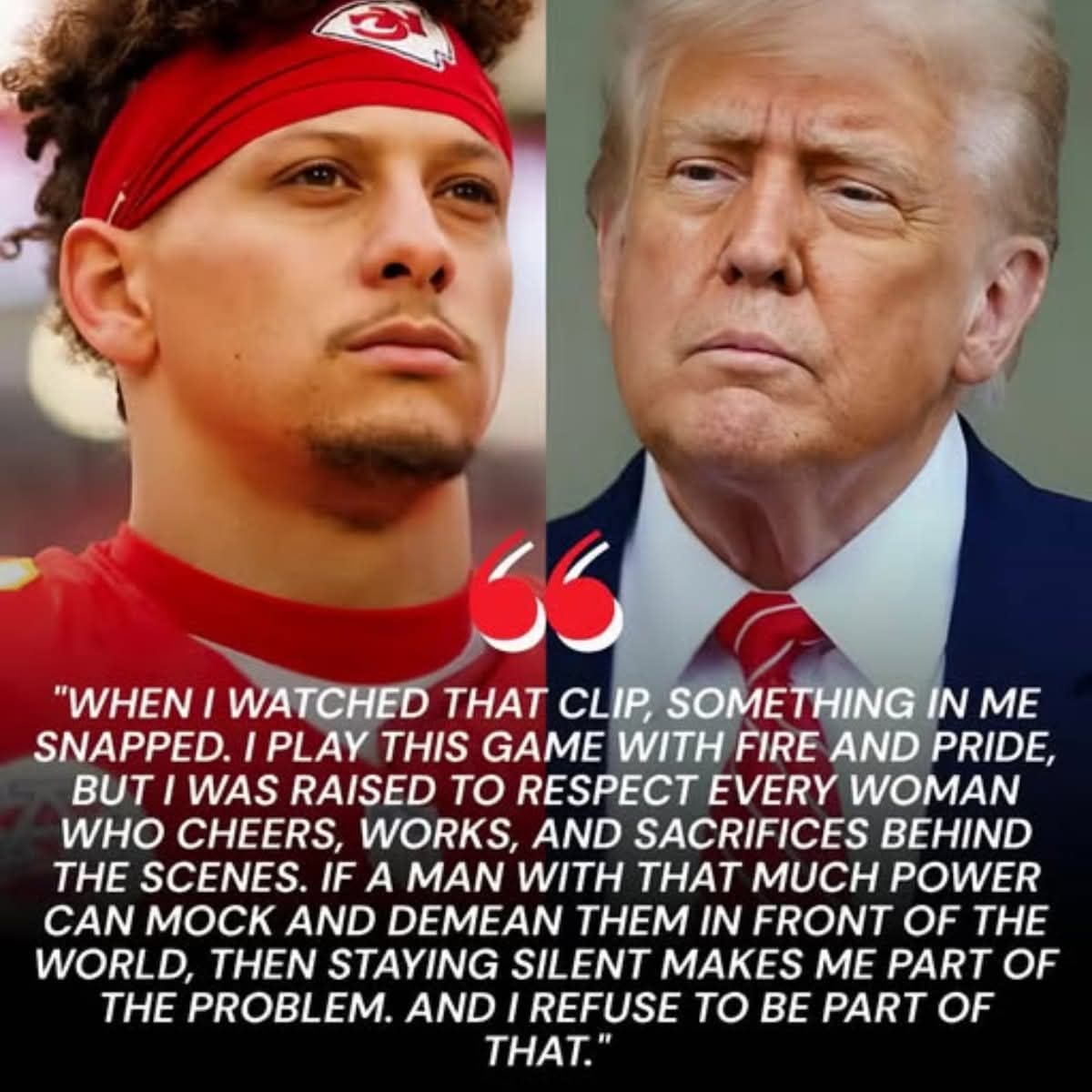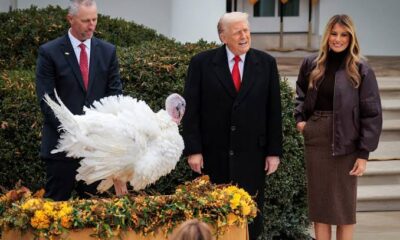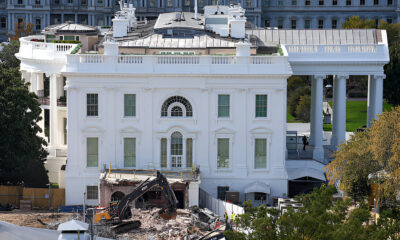CELEBRITY
BREAKING: Patrick Mahomes’ Fiery Response to ‘Little Pig’ Insult Toward Female Reporter Shakes the NFL — Even Trump Is Stunned!

The NFL woke up to a storm this morning—one so intense that even seasoned commentators are calling it one of the most explosive moments of the season. It began as a routine post-game media session, the kind players attend hundreds of times throughout their careers. But in a single, unexpected moment, a female reporter was hit with an insult so vile, so casually degrading, that the room froze. Someone muttered “little pig” under their breath, and although the words were quiet, the disrespect behind them carried like thunder.
At first, people weren’t sure if Patrick Mahomes even heard it. He had just finished answering a question and was preparing to move on to the next. Cameras captured him pausing, slowly turning his head, his eyes narrowing as if he was choosing between staying silent or unleashing something he knew would echo far beyond the Kansas City locker room. When Mahomes finally spoke, he didn’t raise his voice. He didn’t need to. The entire room felt the weight of every syllable as he asked, “Who said that? We’re not doing that. Not to her. Not to any woman.”
The silence that followed was suffocating. Reporters exchanged glances. The players standing nearby shifted awkwardly. The insult might have slipped by unchecked on another day, in another generation—but not today, not with a superstar like Mahomes in the room. His voice carried the authority of someone who understood the magnitude of his platform, the influence of his words, and the responsibility that comes with both.
Within minutes, the clip hit social media. At first, it was disbelief—then anger—then a full-blown national outrage. Fans flooded comment sections demanding accountability. Women across the country began sharing their own experiences with public disrespect, turning Mahomes’ reaction into a rallying point. Commentators compared the moment to past cultural turning points in sports, when athletes decided to use their status not just to entertain the nation, but to challenge it.
What shocked many was how quickly the controversy escalated. Major networks interrupted programming to run the footage. The NFL issued a carefully crafted statement about respect and professionalism, clearly scrambling to control a narrative spiraling far beyond their grasp. And as the story exploded, even political figures began weighing in. One clip spread across social platforms showing former President Trump reacting to the moment during an interview. The usually unshaken, always-ready-with-a-comeback Trump simply blinked, leaned back, and muttered, “Well… that was something.” For someone famous for his unfiltered commentary, being momentarily speechless only added more fire to an already raging national debate.
The identity of the person who said the words remains at the center of the mystery. Some claim it was another player. Others insist it came from a staffer, or even someone off-camera entirely. The uncertainty only deepened the tension. Online detectives slowed the clip frame-by-frame, analyzing micro-expressions, trying to catch a clue that could reveal who delivered the insult that caused a superstar quarterback to stop everything.
Yet through all the noise—through the outrage, debate, speculation, and political shockwaves—Mahomes’ message remained crystalline: disrespect toward women will not be brushed aside anymore. Not in sports. Not in locker rooms. Not in spaces where power has traditionally overshadowed accountability. His words felt less like a reaction and more like a line drawn boldly in the sand.
By nightfall, the story had evolved into something bigger than an insult and a press conference. It became a cultural litmus test, revealing where people stood when the spotlight exposed casual cruelty. Support poured in from female journalists who had endured similar treatment but never had someone with Mahomes’ stature stand up for them in real time. Advocacy groups praised the quarterback for demonstrating what leadership should look like: decisive, principled, and unwilling to stay silent when others are undermined.
Meanwhile, inside the NFL, tension simmered. Reports hinted at internal meetings—urgent ones—where executives debated punishment, public apologies, and how to handle the rising backlash. The league, already battered by criticism on issues surrounding player conduct and treatment of women, could not afford another credibility crisis. Mahomes, without intending to, had put them on the clock.
As the night wore on, the conversation shifted from the unnamed culprit to what this moment represented: a superstar refusing to let normalized disrespect slide, a public demanding accountability, and a league once again forced to confront the culture inside its own walls. Mahomes’ calm but blistering call-out had sparked something raw, something undeniable.
And now, the NFL waits. The fans wait. The media waits. Whoever uttered those words knows the world is watching.
One thing is certain: the moment Patrick Mahomes turned, paused, and delivered that sharp, unwavering rebuke has already entered NFL history. Not for the game played that day, but for the stand taken in a room that wasn’t meant to host a national reckoning. In a single moment, Mahomes reminded America that real strength isn’t in the touchdowns or trophies—it’s in the courage to call out disrespect, even when it’s easier to ignore it.
And the shockwave from that courage is still moving. It hasn’t stopped. It may not stop for a long time.



















